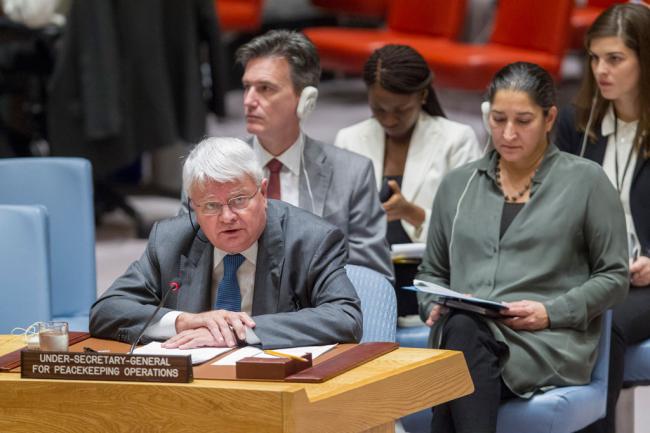
Central African Republic needs support to tackle ‘spoilers,’ other challenges – UN peacekeeping chief
“While the needs are many, I am convinced that with our concerted and continued support, Central Africans can lay the foundations for peace,” Hervé Ladsous Under-Secretary-General for UN Peacekeeping Operations, said in his briefing on the work of the Multidimensional Integrated Stabilization Mission (MINUSCA), alongside the Chair of the Central African Republic configuration of the UN Peacebuilding Commission.
More than three years of war and sectarian violence have displaced thousands of people in the CAR amid continuing clashes between the mainly Muslim Séléka rebel coalition and anti-Balaka militia, which are mostly Christian.
Ladsous introduced the Secretary-General’s report on developments in the CAR, which welcomed the inauguration of a democratically elected president, Faustin-Archange Touadéra, and pledged the Mission’s full support to the Government in such critical efforts as reintegration of armed groups, reform of the security sector, improvement of still grave humanitarian conditions, inclusive economic development, reconciliation and other necessary components of peace consolidation. Such efforts, the Secretary-General noted, would take “dedication and time.”
Updating the Council on key developments since the issuance of the report, Ladsous said that the end of the rainy season — a traditionally volatile period — has been used by armed groups and other “spoilers” to advance their interests. Last week, dozens of people were killed in unrest following the shooting of a member of the Central African Armed Forces in a predominantly Muslim neighbourhood.
MINUSCA, he said, acted decisively to prevent intercommunal violence from spreading, securing the perimeter of the neighbourhood, coordinating its response with the national authorities, responding to the needs of civilians, encouraging community dialogue and continuing to support efforts to address impunity.
Clashes also took place in the north-west and the Kaga Bandoro region between anti-Balaka and ex-Séléka factions, resulting in attacks on civilians and aid groups, causing operations to be suspended in September, he said. Activity of those factions had also been reported in the north-east of the country. MINUSCA continues to maintain a robust posture against such violence and was enforcing weapons-free zones.
In contrast to the worrying flare-ups of armed activity, he said that national authorities continue implementing President Touadéra’s agenda, including engaging 11 out of 14 armed groups in a dialogue on reintegration. MINUSCA is meeting with armed groups to encourage their participation, he added.
For the international support needed, Ladsous said, the importance of the Brussels donor conference on 17 November, for which the country’s five-year needs had been assessed and a framework for accountability created, “could not be over-emphasized.” Sustained international engagement had often been lacking in previous crises in the country, leading to relapse into violence. “While the primary responsibility rests with the Central Africans, we must ensure that this mistake is not repeated,” he stressed.
Meanwhile, Abderrazzak Laassel of Morocco, the Chair of the Peacebuilding Commission’s Central African Republic configuration, also briefed the Council on the ninth meeting of the International Contact Group for the country, chaired by the African Union (AU) and the Republic of the Congo. At that meeting, interlocutors expressed the need for strong political and financial support for disarmament, demobilization, repatriation and reintegration, he said.
Noting that MINUSCA has the challenging task of supporting reform of the security sector, he said that the European Union has initiated a military mission to train two battalions of the Central African Armed Forces, known as the FACA, in the effort to build a professional army. Based on the draft National Security Policy, the reform programme would need reinforcement of the police and gendarmerie, as well as a clarification of their respective mandates, with the aim of extending State authority in the entire territory.
“National reconciliation remains a matter of concern,” he said, as a relevant strategy has not yet been adopted. Some local initiatives are encouraging, especially the activities of the religious platform. National reconciliation, however, could not be successful without addressing the issue of impunity, he said, noting that some key steps had been taken towards the establishment of the Special Criminal Court.
He said support of the international community would be crucial in the coming months. Highlighting the need for success of the upcoming donor’s conference in Brussels, he said the national strategy for recovery and peace consolidation, as well as a framework for mutual accountability with the international community, would need to be shared in advance.
UN Photo/JC McIlwaine
Source: www.justearthnews.com
Support Our Journalism
We cannot do without you.. your contribution supports unbiased journalism
IBNS is not driven by any ism- not wokeism, not racism, not skewed secularism, not hyper right-wing or left liberal ideals, nor by any hardline religious beliefs or hyper nationalism. We want to serve you good old objective news, as they are. We do not judge or preach. We let people decide for themselves. We only try to present factual and well-sourced news.







